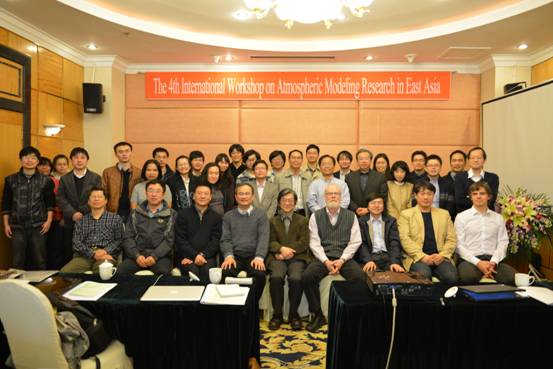The 4th International Workshop on Atmospheric Modeling Research in East Asia of Modeling Inter-Comparison Study-Asia Phase Ⅲ(MICS-Asia Ⅲ) was held successfully in the economic and trade hotel in Kunming of Yunnan Province from 3rd to 5th March 2013. It was co-host by the Institute of Atmospheric Physics (IAP) affiliated to Chinese Academy of Science (CAS) and Asia Center for Air Pollution Research (ACAP) of Japan, undertook by the State Key Laboratory of Atmospheric Boundary Layer Physics and Atmospheric Chemistry (LAPC).More than 40 specialists and scholars from home and abroad attending this workshop. Worldwide well-known scholars Prof. Greg Carmichael from the University of Iowa, Prof. Hajime Akimoto from ACAP, Prof. Joshua Fu from the University of Tennessee, Prof. Jun-hun Woo from the Konkuk University as well as other relative researchers from Canada, Vietnam, Thailand, Malaysia and Taiwan are included in this workshop. Meanwhile, the scholars from influential research institutes of China like the Tsinghua University, Sun Yat-sen University, Nanjing University and IAP are also invited to this workshop.
This workshop is co-chaired by Prof. Zifa Wang from LACP and Prof. Hajime Akimoto from ACAP, the main task of this workshop is to discuss and finalize the work plan as well as task distribution for MICS-Asia. During the meeting, Prof Zifa Wang, Prof. Jun-hun Woo and Prof.Greg Carmichael respectively introduced the specific work scheme of the three topics of MICS-Asia Ⅲ(the comparison of modeling system, the comparison of emission resource inventory and the change in atmosphere environment and climate).All the participants discussed the work scheme in details, every task involved in this scheme has been clearly assigned and the related deadlines have been decided as well. 16 wonderful academic reports have been distributed during the second day of the workshop. The contents are mainly focus on the air pollution numerical simulation, the present situation of emission resource and the processing method, air pollution and climate change in Asia.
The plan for MICS-Asia Ⅲ is made for evaluating the advantages and shortcomings of multi-scale air quality modeling applied internationally, reducing the uncertainty of Asian air quality simulation, establishing a more reasonable anthropogenic emission source inventory in Asia, studying the interactions between the atmosphere and climate change. The success of this workshop has promoted the implementing of MICS-Asia Ⅲ, meanwhile, it has a great significance on improving the simulation ability for air quality.

